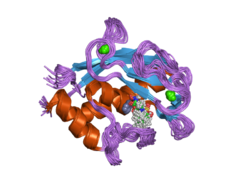Matrix-Metallopeptidase 20
| Matrix-Metallopeptidase 20 | ||
|---|---|---|

| ||
| nach PDB 2JSD | ||
| Eigenschaften des menschlichen Proteins | ||
| Masse/Länge Primärstruktur | 376 Aminosäuren | |
| Kofaktor | 2 Zn2+, Ca2+ | |
| Bezeichner | ||
| Gen-Name | MMP20 | |
| Externe IDs | ||
| Enzymklassifikation | ||
| EC, Kategorie | 3.4.24.-, Metalloprotease | |
| MEROPS | M10.019 | |
| Reaktionsart | Proteolyse | |
| Substrat | Amelogenin, Aggregan, COMP | |
| Vorkommen | ||
| Homologie-Familie | MMP | |
| Übergeordnetes Taxon | Eukaryoten | |
| Orthologe | ||
| Mensch | Maus | |
| Entrez | 9313 | 30800 |
| Ensembl | ENSG00000137674 | ENSMUSG00000018620 |
| UniProt | O60882 | Q3LRH7 |
| Refseq (mRNA) | NM_004771 | NM_013903 |
| Refseq (Protein) | NP_004762 | NP_038931 |
| Genlocus | Chr chr11: 101.95 – 102 Mb | Chr chr9: 7.63 – 7.67 Mb |
| PubMed-Suche | 9313 | 30800
|
Matrix-Metallopeptidase 20 (Enamelysin), auch bekannt als MMP20, ist eine Peptidase, die in allen Eukaryoten vorkommt und beim Menschen die Zahnproteine Amelogenin, Aggrecan und COMP abbaut. Mutationen im MMP20-Gen können zur Amelogenesis imperfecta führen.[1][2]
Die Proteine der Matrix Metalloproteinase (MMP) Familie sind am Aufschluss der extrazellulären Matrix beteiligt und üben ihre Funktion bei zahlreichen physiologischen Prozessen aus, wie etwa im Rahmen von Embryonalentwicklung, Fortpflanzung, Gewebeumformung aber auch bei Krankheitsprozessen, wie der Arthritis und bei der Tumormetastasierung. Die meisten MMP's werden als inaktive Proteinvorläufer aus der Zelle ausgeschleust und durch Spaltungsprozesse mittels extrazellulärer Proteinasen aktiviert. Das hier beschriebene Protein degradiert Amelogenin, das Hauptprotein der Zahnschmelzmatrix. Man vermutet deshalb, das es eine Rolle bei der Zahnschmelzbildung spielt. Eine Mutation des Gens für MMP20, welche das normale Splicing der MMP20-mRNA stört und dazu führt, dass die Translation vorzeitig abgebrochen wird, wurde mit einer Form der Amelogenesis imperfecta in Verbindung gebracht. MMP20 gehört zu einer Gruppe eines Genclusters verschiedener MMP-Gene auf Chromosom 11q22.3.[1]
Literatur
[Bearbeiten | Quelltext bearbeiten]- Nagase H, Woessner JF: Matrix metalloproteinases. in: J. Biol. Chem. vol. 274,31 pg. 21491–4 (1999) PMID 10419448
- Bartlett JD, Simmer JP: Proteinases in developing dental enamel. in: Crit. Rev. Oral Biol. Med. vol. 10,4 pg. 425–41 (2000) PMID 10634581
- Pendás AM, Santamaría I, Alvarez MV, et al.: Fine physical mapping of the human matrix metalloproteinase genes clustered on chromosome 11q22.3. in: Genomics vol. 37,2 pg. 266–8 (1997) PMID 8921407
- Llano E, Pendás AM, Knäuper V, et al.: Identification and structural and functional characterization of human enamelysin (MMP-20). in: Biochemistry vol. 36,49 pg. 15101–8 (1998) PMID 9398237
- Stracke JO, Fosang AJ, Last K, et al.: Matrix metalloproteinases 19 and 20 cleave aggrecan and cartilage oligomeric matrix protein (COMP). in: FEBS Lett. vol. 478,1-2 pg. 52–6 (2000) PMID 10922468
- Terp GE, Christensen IT, Jørgensen FS: Structural differences of matrix metalloproteinases. Homology modeling and energy minimization of enzyme-substrate complexes. in: J. Biomol. Struct. Dyn. vol. 17,6 pg. 933–46 (2000) PMID 10949161
- Väänänen A, Srinivas R, Parikka M, et al.: Expression and regulation of MMP-20 in human tongue carcinoma cells. in: J. Dent. Res. vol. 80,10 pg. 1884–9 (2001) PMID 11706946
- Väänänen A, Tjäderhane L, Eklund L, et al.: Expression of collagen XVIII and MMP-20 in developing teeth and odontogenic tumors. in: Matrix Biol. vol. 23,3 pg. 153–61 (2005) PMID 15296943
- Kim JW, Simmer JP, Hart TC, et al.: MMP-20 mutation in autosomal recessive pigmented hypomaturation amelogenesis imperfecta. in: J. Med. Genet. vol. 42,3 pg. 271–5 (2006) PMID 15744043